
Prevailing Love: A Saints Spotlight with Lexi Williams and Jordan Skidmore
In this Saints Spotlight, Lexi and Jordan, nursing students at Thomas More, share their personal reflections and opinions on a trip to the Diocese of Brownsville in South Texas with Sr. Kay Kramer, CDP, in March 2025. They share their experiences assisting with medical and educational outreach efforts to underserved communities in that region, discuss the challenges they faced, the lessons they learned, and the aspirations they took home. Offering their advice to fellow students, Lexi and Jordan emphasize the importance of showing love and compassion when serving people in need and honoring human dignity.
Inspired by the Catholic Intellectual Tradition, Thomas More University challenges students of all faiths to examine the ultimate meaning of life, their place in the world, and their responsibility to others. Historically, the University has offered international service learning in Jamaica, Nicaragua, and at the southern U.S. border. For more information about the annual nursing service trip to the southern border, read an article by the Messenger about the 2024 trip here. You can also read about the 2024 Border Studies trip with Dr. James Camp to El Paso/Juarez here with links to past articles. Read more about Catholic Social Teaching surrounding immigration here.
Kendra Yurt (KY): You went on a spring break trip to Texas led by Sister Kay Kramer. Tell us about your experience and what you did while you were there?
Jordan Skidmore (JS): Over spring break, Lexi and I, along with four of our friends, took a trip to Weslaco, Texas with Sister Kay Kramer. She is a nun with the Sisters of Divine Providence here in Northern Kentucky. She also used to be a faculty member for the nursing program at Thomas More. We went down to Texas to serve migrants on the border, as well as we spent time in a place called Holy Family, which is a natural birthing center. What that means is that there’s no medications involved, as it is very much a more family-centered approach to the birth process. A big thing they do there is water births, which you could see in the hospital, but it is not recommended in Western culture as a standard practice.
Lexi Williams (LW): They also include their other kids, as the older kids are involved in catching the baby or helping mom through what the mom needs, if the mom wants.
JS: It’s a very much more holistic approach to natural birth and childbirth in general. While we were down there, we spent time on the border where we saw some big shifts from the administration in the current state of the U.S. In Progreso, there’s a bridge where you can walk from Mexico into the U.S., and the inverse. Last year’s group (2024 nursing trip) met several migrants that were waiting on the border because they live there while they’re seeking asylum.
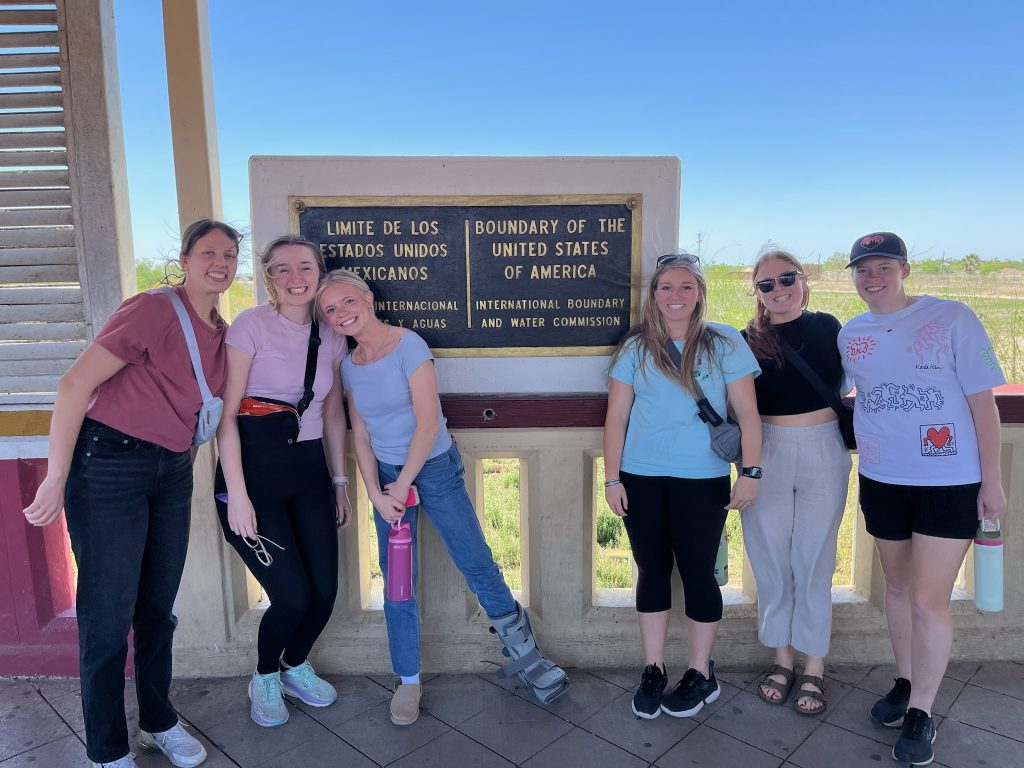
LW: Some of them live in tents; most of them just have a blanket, their kids, and their family. They have nothing.
JS: The way it used to be, they would get a number, essentially, like a deli counter, and they would have to wait their turn to go up and try to file for asylum within the United States. That is no longer happening since, I believe, Jan. 18, 2025, these individuals were forced off the border, whether they were waiting for papers or not, they don’t live there anymore. We did see an old structure that someone had lived under the bridge in, but no longer resides there, they just have not bothered to take it down. We also traveled to a respite center, where people who had migrated could go and get services to help direct them to where they were trying to get to in the United States. They come here, they don’t speak English, they don’t have the resources, they sometimes [only] come with a backpack, or they don’t come with anything.
LW: It was short-term, maybe up to a week’s stay, where they connect you with your family, if you have family here, and they will get you either on a plane or a bus from your family’s providence. Then, you go meet your family wherever [they reside]. They [the respite center] help with your paperwork and getting that started.
JS: That doesn’t happen anymore and they [the respite center] were pretty much a ghost town. To put it into perspective, there was one woman living there who had gotten in on Jan. 17, and her baby was in a nearby hospital. They used to see over 200 people a day in this shelter, now down to zero. Now, to give back and serve in that community, we did go to this place called La Posada Providencia, which is a long-term respite center.
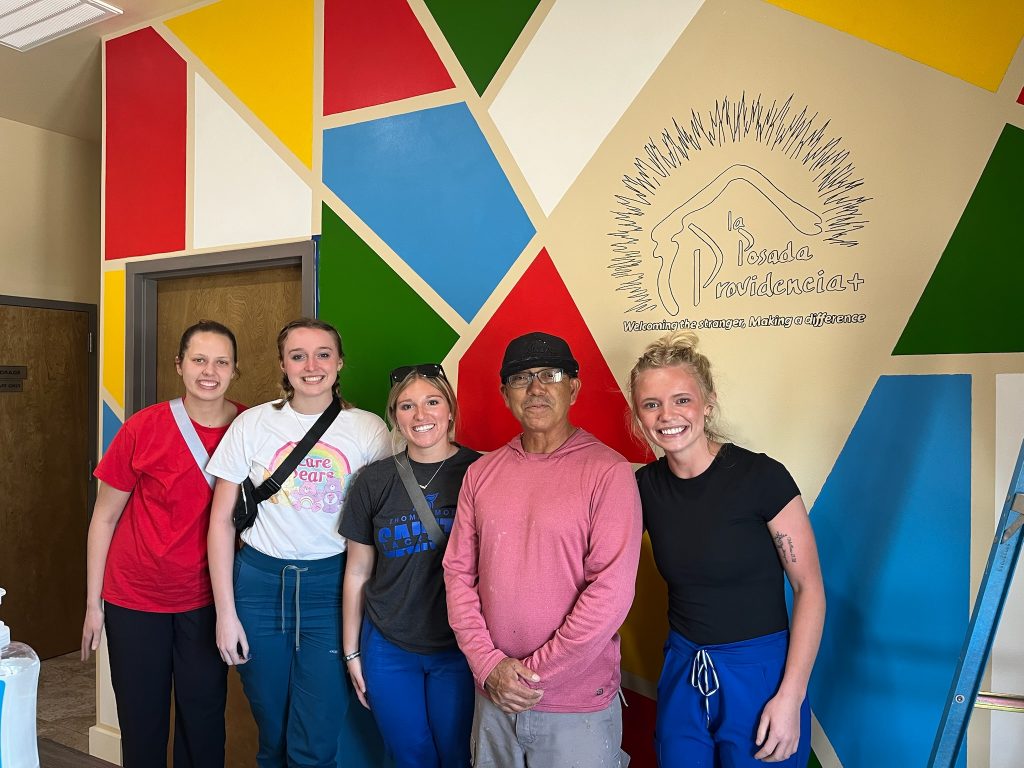
LW: We spent a lot of time there, and it was the biggest impact place we went to. It was just a big family, and you wouldn’t know that these people didn’t know each other a few months ago. They were all family helping each other, and they were all so caring. I mean, they had nothing, but they were so grateful just for what they could have.
JS: We saw firsthand the effects of the administration’s decisions and how they are handling migrants; how it’s actively affecting that community. The [Thomas More nursing] seniors spent part of their day in the short-term respite center and they helped serve on the bridge [in Progreso].
LW: I think they spent two or three days there. That was their big, main serving center – the short-term respite center.
JS: When we got there, we also had preliminary meetings with Sister Kay, and she would keep us updated on the current climate of the situation. It felt like each meeting she was like, “So, it’s changing, things are changing.” I don’t like to say it’s getting worse, but, honestly, things are getting worse with how these people were being rejected.
LW: We had more hope of what things would happen at the beginning. In each meeting, it just knocked down that hope a little bit each time.
JS: Sister Kay doesn’t normally go to La Posada, but she said this year she had reached back out because at the short-term center there was nothing for us to help with, not a single thing. They had one woman working in the kitchen, and she had an excess of food that she had made because there was no one to eat it. I really felt like I was making a difference, whether I was working in the garden or teaching these women or playing with the kids. Me and Rose spent time playing with these little kids, and they love it. They know you can’t speak English, and they’ll laugh at you.
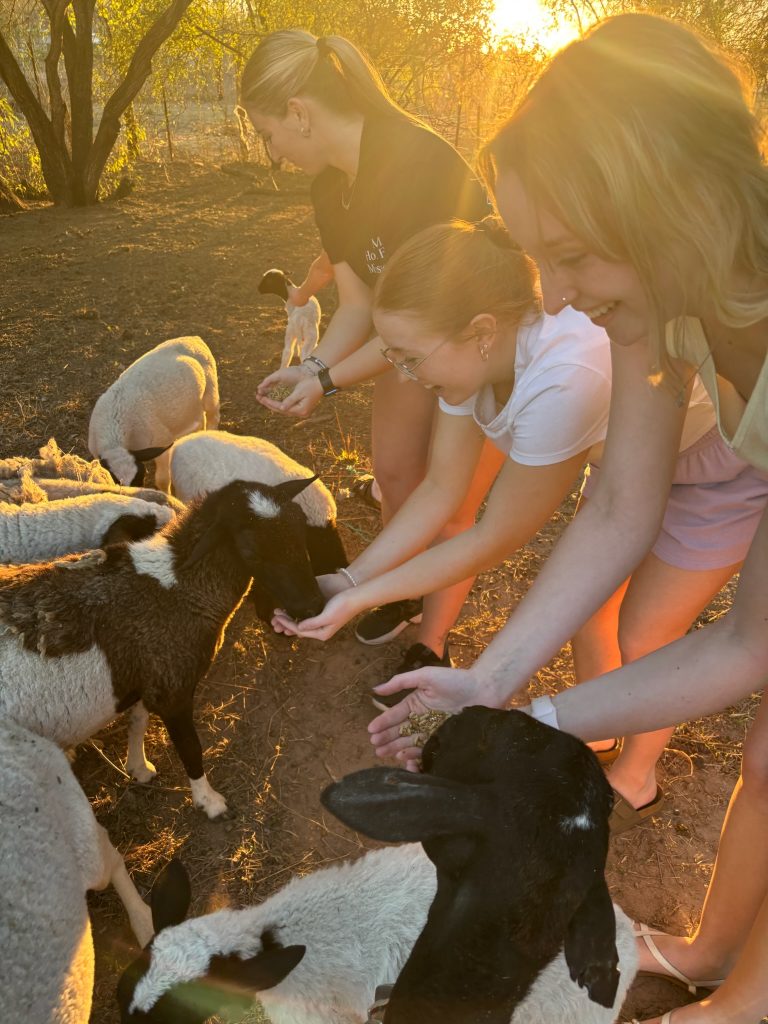
You even see how, not even cultural norms, just like developmental norms are very similar between age groups. I sat down with this little girl, and she had these hair clips, nail polish, a headband, and these bracelets. I was sitting down, and she was like, “Can I paint your nails?” You gesture a lot, I am not fluent in Spanish, just minimal conversational Spanish. She was painting my nails, doing her thing. She was loving it and I was loving it. Then, she gave me one of her bracelets, and I did not want to take it because – to put it into perspective – these families come over here and one woman had a clear tote for their stuff and that was all their stuff. I kept trying to give it back to her, and one of the moms eventually had to step in and tell me, “No, that’s yours now. She does not want that back. It’s a gift.” Seeing kids at that young age, she was maybe six or seven, it just gave you a perspective on how these people just want to serve you too and [how they] appreciate everything. That was one thing that I was not necessarily expecting but took away from it, the whole act of pouring into one another is a big thing. The one big goal of mine going into this trip was being able to pour into another community that is so incredibly underserved. This trip definitely put into perspective how lucky I am. How lucky that I’ve never experienced food scarcity or I’ve never experienced having to rely on another outside party to provide basic resources for me. My parents have always been capable and have been able to provide me with, at minimum, everything I’ve ever needed, and most of the time, most of the stuff I wanted.
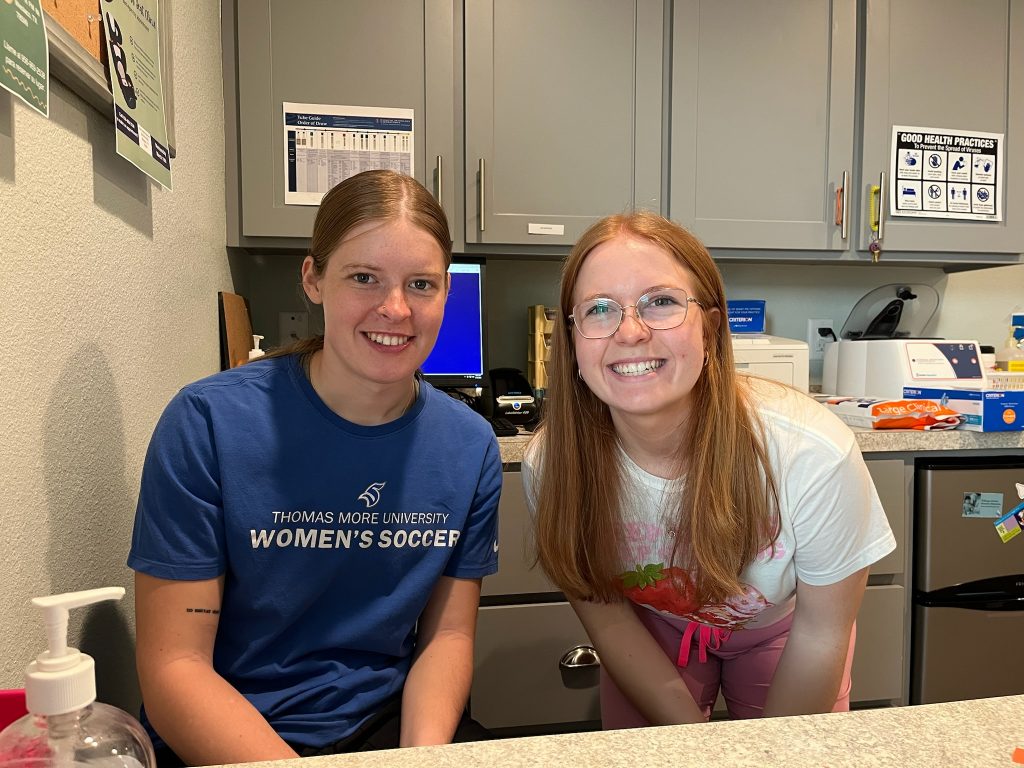
KY: How would you say this relates to the Catholic social teaching on human dignity?
JS: It really shows you that people are human. No matter what background you come from, your race, your ethnicity, your gender, you’re a person at heart, and you deserve the same respect that everyone else is given. You, too, should also honor yourself with that respect. Honor their life, don’t treat them like something that you can bulldoze over. That is what it feels like is happening, and they’re being disregarded – that they are not a person, and they deserve to live in these circumstances. They don’t deserve that.
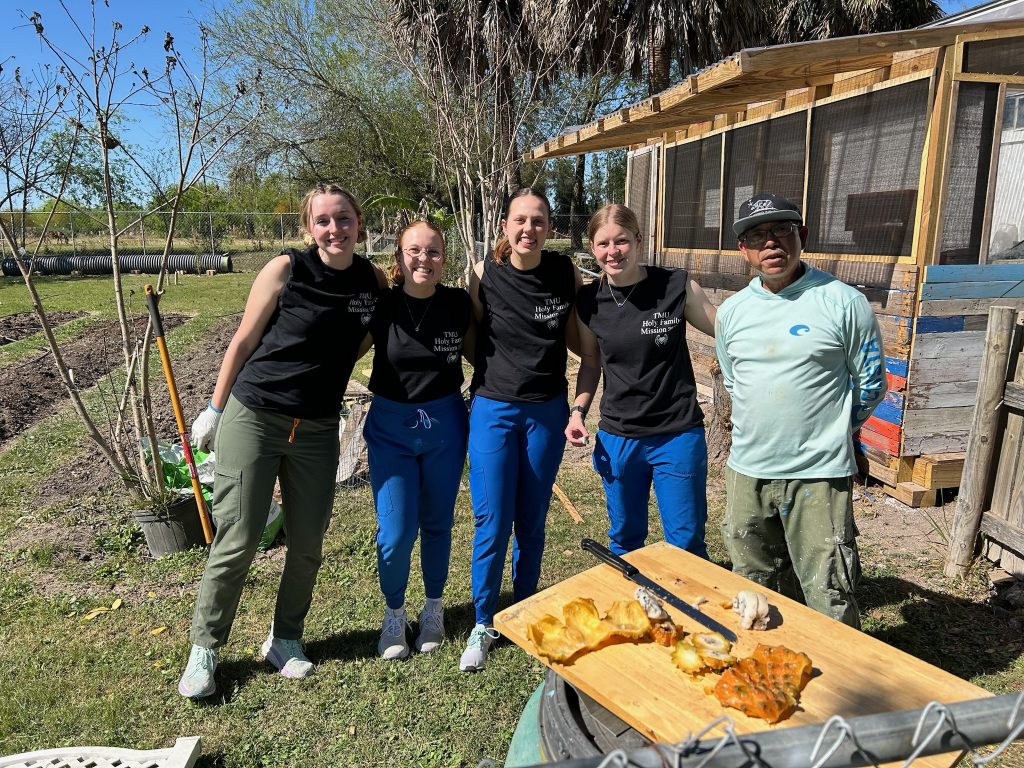
LW: I realized to go into every situation with an open heart and an open mind. Do not ever look at somebody’s background, what they have done, or who they are. This is a person who needs help, and they are just trying to get as good of care as they can. Care for them as you care for your sister, your mom, or your dad. They are somebody’s kid, they are somebody’s mom, they are somebody’s dad, they are somebody’s somebody – give them the same respect and love as you would give your own.
JS: You’re culturally competent, but you are also just caring for them as a person. They are someone.
LW: They may not be someone to you, but they are someone to someone
JS: They deserve to be treated like a normal person with the same respect, regardless of where they come from. Another big piece, even when we had meetings with Frank and Mary (Fritsch), those are the people that sponsor our trip – thank you very much, Frank and Mary!
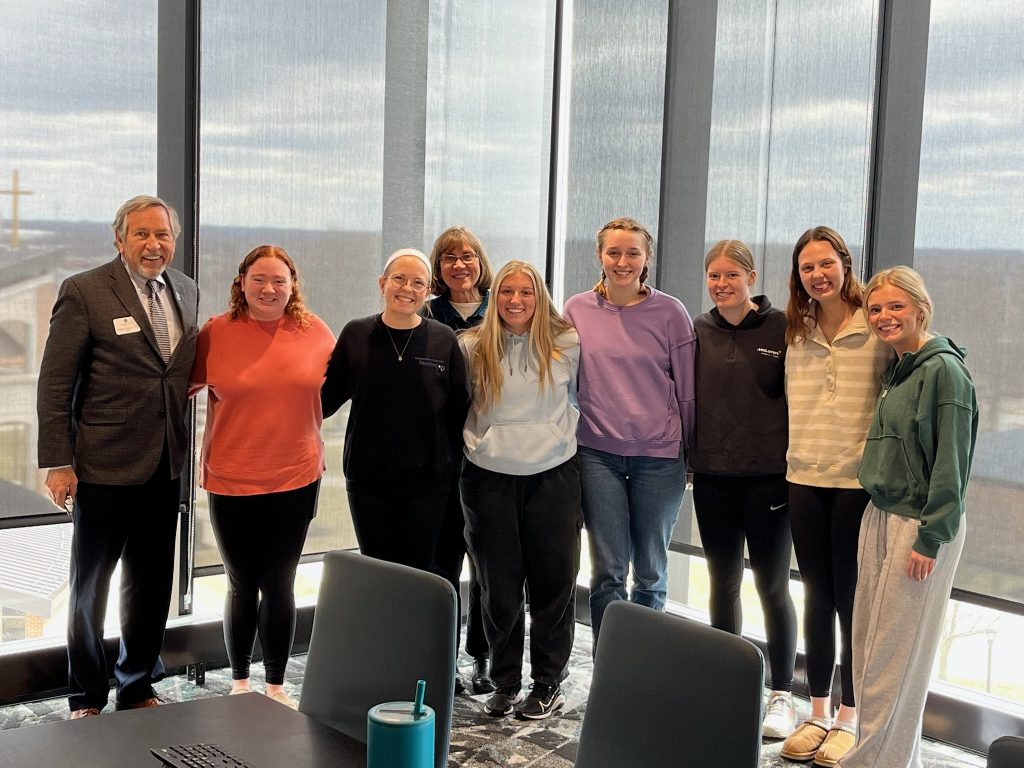
LW: They (Frank and Mary) are the sweetest, best humans ever.
JS: They are so kind! It’s the concept that love prevails. No matter the circumstance, love will show through and pouring that love into any patient you care for makes a difference. Your patients recognize when you care about them, or you’re just trying to do your job and get through the day.
LW: If you have somebody who’s caring and pushing for you to get better, you’re going to want to care and push for yourself.
JS: Just the fact that, these people love no matter what. Everyone has a little bit of frustration, and I don’t want to use the word ‘hate,’ but we don’t ‘love’ everyone. You can pour into them with that love, too; it doesn’t hurt you to be kind to another person.
LW: Honestly, it hurts you to be mean to somebody – it takes more effort.
JS: Especially as a nurse, these are your patients. They’re coming to you at their lowest time. You get to celebrate with them at their lowest of lows and their highest of highs, loving them through that whole process makes a difference, and they feel it, too.
KY: Do you have any advice for nursing students or students in general who are looking to go on mission trip?
LW: Go, definitely go, don’t second guess it, just go. You will not regret it one bit.
JS: Any experience is experience, and if we’re talking on the business side of things – when you go to apply for a job, that looks great! People want to see that you are wanting to work within the community, and diversify your aspects. Even on the life front, I would never, ever have gotten that experience to serve these people in that setting.
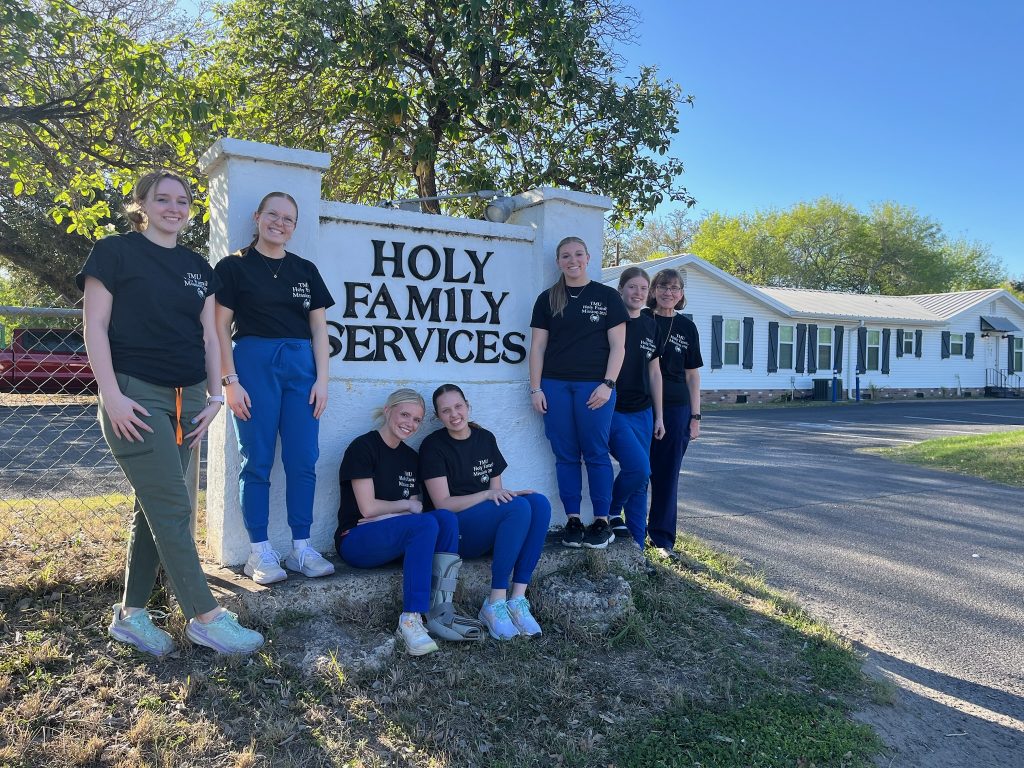
LW: It makes you a better person, too.
JS: It really puts into perspective that (I think one of the seniors told me this) your worst day, for somebody in their position, may be their best day ever. Your worst day is not as bad as theirs. I know in our environment, we always say, “everyone’s entitled to a bad day,” which you are, I don’t want to discredit that, but you have to put it into perspective.
LW: There is someone out there whose worst day is so much worse than yours.
JS: They’re struggling to just meet the critical aspects of life and the most basic things.
LW: Go on every opportunity you get. Life doesn’t happen twice, take everything to the full advantage.
JS: Love will prevail. It’s also okay to have challenges because everyone is challenged, whether it’s in the most extreme way or a minor way. Embrace it and feel the love through it.
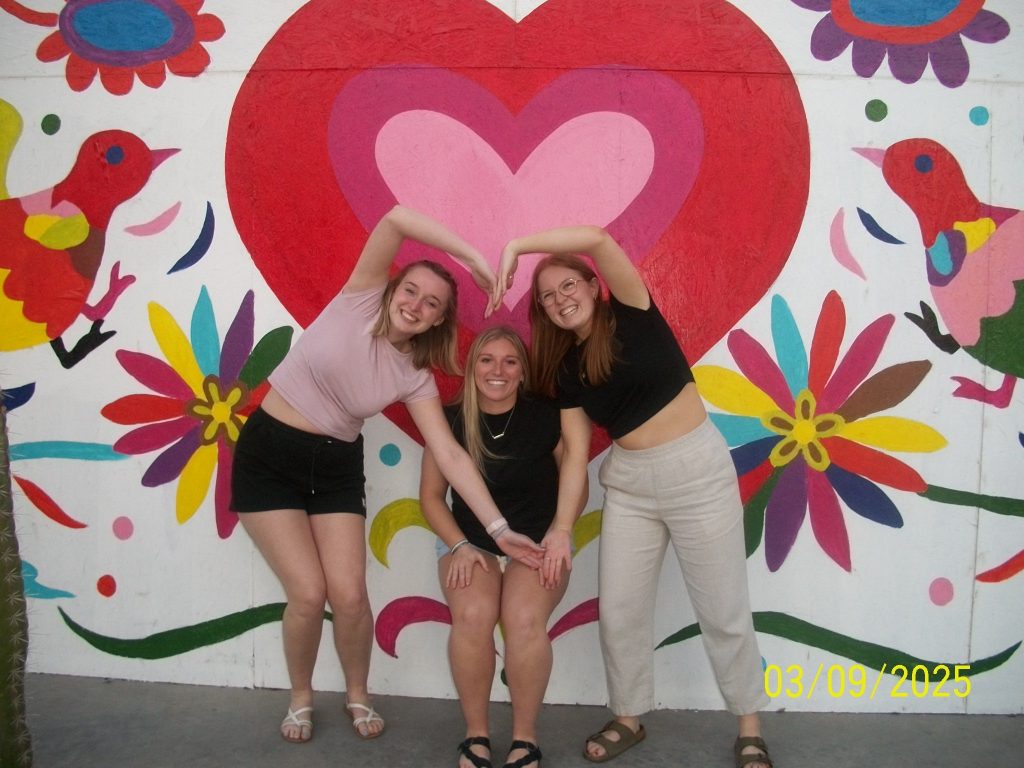

Comments are closed, but trackbacks and pingbacks are open.